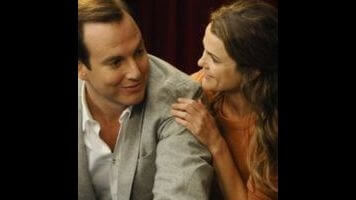When I was in college, my friends and I played a lot of Tekken—a fighting game that was basically a more-grounded Street Fighter, if you consider a lack of hadoukens as the only qualifier for such a statement. We each went through phases of trying out different characters, each with his or her signature moves (that we could figure out). Paul was an average fighter who had this one really powerful punch that would take away 80 percent of your opponent's health, but you had to wait for it to fully wind up. Jin had a kick that swept at the opponent's upper body, then his legs, which meant it was basically unblockable; it was cheap, though, and once your opponent picked up on your "strategy" it was easy to stop. Nina kicked people in the balls but had to do it at exactly the right time, or the kick would miss. Xiaoyu was not so much a girl as a flurry of hands and feet, pecking away health bit by bit. Each had obvious strengths, and each had obvious weaknesses. We went on like this for a while. Then Hogan Lee, from across the hall, walked by my friend's room and saw us playing. He innocently asked if he could work his way into the rotation. He chose Paul, and we all laughed to ourselves (presumably, at least I did): How silly of him to choose the guy with the one really powerful, albeit slow, punch. We saw how this was going to end.
Except Hogan kicked all our asses by unleashing a never-before-figured-out massive combo attack—a beautiful Tekken symphony of quick jabs, powerful kicks, frantic ankle slams and slow elbows-to-the-face. Every move was timed perfectly so once your character was receiving the beat-down, there was no escaping. He never once used the powerful wind-up punch, either.
Tonight's Running Wilde was off, and it took me a while to figure out why. It's been two weeks without an episode, and it was certainly nice to see all the familiar faces again; Mitch Hurwitz has made all the characters likable. And almost immediately, each fell right back into the dynamics they've been establishing and exploiting over the show's first season. Yet the episode never hit its stride, or even found its footing.
I'm beginning to think the problem is in the way the jokes are written, in the very show framework itself. Ideally, comedies have jokes with short payoffs (some are just one line), jokes that require a bit of set-up, and jokes that only really show themselves at the end, when all the pieces of the episode have been set in motion. There's a rhythm to the way they're spaced out—the short jokes hide the fact that bigger jokes are being set up, for example—and the result is a half-hour of comedy that feels effortless. Running Wilde hasn't yet found its groove, though. Jokes fire spastically, tripping over each other and causing even more confusion. Running Wilde doesn't feel like its own show, but rather an amalgamation of the joke structures and senses of humor of a bunch of different shows. Right now it's like my friends and I and Tekken, choosing whatever character we feel like playing at the moment, unaware that the secret to painless success has been right there the whole time.
If you simply count the number of jokes in "Best Man," though, you'd get a really high number. It kicks off by demonstrating how Steve has been slipping Emmy subliminal messages over the last few days. There was a desperation in each step he took, and a hidden laugh in the fact that Steve felt oddly compelled to buy the book that teaches you how to make people feel oddly compelled to do things. Or, rather, it would have been better hidden later in the episode, not right after introducing the book and a few more times in the following two minutes. There's a romance novelist that Steve keeps on speed dial—fodder for his enduring courtship of Emmy, as well as for the literal romance novel he asks the novelist to write. Steve also flips from obliviousness to the proper use of "star-crossed lovers" and "double entendre," to an acute awareness of an elaborate game of chicken he finds himself playing with Emmy. See, Emmy simply wants Steve to admit he doesn't want Emmy to marry Andy, and instead Steve begins the preparation for Emmy's wedding, in the hopes the more real it seems, the more likely she'll be to call it off.
The middle section of the episode is largely devoted to watching how the wedding turns from a simple affair into a full-blown Medieval-themed carnival charging unaffiliated patrons for a three-day wristband. Then, suddenly, the end embraces the Rennaissance Faire vibe with an awkward joust and Fa'ad singing the events in the background (when he's not trying to get into Steve's house through the window). Andy appears, and earns laughs with some truly outlandish moments, including an impromptu visit to Canada on horseback, the line "What I lack in height I make up for in lady-pleasing," and a throwaway sentence pronouncing Fa'ad's name horribly wrong. Those little gags come out of nowhere in a good way, but for the most part, the episode drops any attempt at quick jokes and services the increasingly convoluted larger gags. There's no harmony in "Best Man." The characters and storylines are all playing different games when they should be playing the same one.
I wonder what would happen if Steve was in every scene. Hurwitz has said that Running Wilde is meant to be a romantic comedy, but where Steve creates the cartoonish chaos of the world, Emmy is less-than-cartoonish in the way she reacts to it. This needs to be Steve's story. He's the Paul of Running Wilde; we just need a quiet Korean kid to reveal his true potential.

